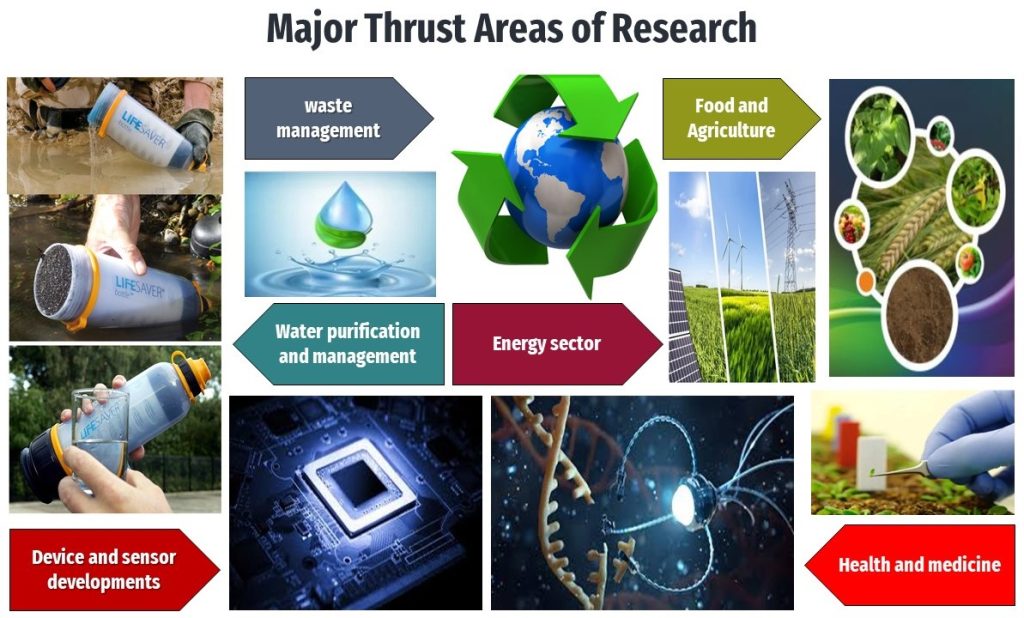
Waste water treatment is one of the important sectors to focus in order to overcome the most threatening issue of waste disposal and to ensure sustainability. Sustainable and energy efficient treatment methods are the attractive technologies for their current implementation of waste management. Even though the existing technologies are effective, unsustainability makes them unfit for their extended applications. Conventional and advanced technologies have been extensively implemented for the treatment of wide spectrum of effluents. Hybrid technologies including chemical and biological methods, Nanotechnology and membrane technology are the promising and emerging areas of interest due to their widespread applications in waste water treatment. Carbon nano structures, nano filters, graphene, nano magnets modified with activated carbon are the potential candidates for the treatment.
Theoretical and computational nanomaterial science is an exciting, contemporary and broad research field rooted in science. These methods stand for the vibrant interfaces between physics, chemistry, biology, and nanomaterials science, and provide ongoing experiments with new insights and allow us to study molecular systems in the absence of experiments. The present project aims at the application and development of new theoretical and computational methodologies for the accurate geometric and structural design of new nanomaterial for the sustainable energy applications at molecular level. Computational modeling of molecular structure-morphology-device properties are of great importance in a variety of technologically important naomaterial systems.
It is crucial to explore the potential of alternate energy harvesting technologies in light of the rising worldwide need for energy. This emphasizes the importance of developing new methods of power transmission that are both lightweight and require little space. Triboelectric nanogenerators have emerged as a promising option for low-power devices since they are self-recharging, entirely solid-state, and lightweight. Polyurethane, having a very good triboelectric property, is an excellent material for the triboelectric positive layer. Biofillers like cellulose, chitosan, lignin, etc. have the capability of enhancing the stability and efficiency of triboelectric nanogenerators.
Nanotechnology has the potential to impact many aspects of food and agricultural systems. Food security, disease treatment delivery methods, new tools for molecular and cellular biology, new materials for pathogen detection, and protection of the environment are examples of the important links of nanotechnology to the science and engineering of agriculture and food systems
Nano fertilizers are being an effective method in precision agriculture with matching the crop growth stage. The importance of nano-fertilisers is to improve the nutrient use efficiency and crop production. But most of these studies mainly focus on the nano based chemical fertilizers. Considering the adverse impact of chemical fertilizers on atmospheric and groundwater pollution, soil acidification, eutrophication, decline of soil fertility, loss of biodiversity and high consuming of energy in synthesis processes, attempts are being made towards shifting the farming with environmental friendly bio fertilizers and organic manures. The inadequate supply of good quality organic supplements seem to be a major impediment in this sector. Hence, formulation of nano based organic manure can play a key role in sustaining the health of soil, crop produce, environment and society as a whole in the years to come.
In the area of polymer nanocomposites, we have synthesized several nanofillers and fabricated high performance nanocomposites based on PS, EVA, NR and epoxy resin. The morphology, mechanical properties, rheology and failure properties of these composites have been carefully analyzed.
In the area of chemical modification of polymers, we have done excellent work on the chemical modification of PP, HDPE, PEEK, natural rubber and cellulosic materials for chemical reactions at the interface during reactive processing with other polymers. The modified polymers were characterized by different techniques. Polymer nanocomposites, Biopolymers-Development of fully biodegradable macro, micro and nano ‘green’ composites, Fibre filled polymer composites, Natural and synthetic fibre reinforced plastic composites, Polymer foams.